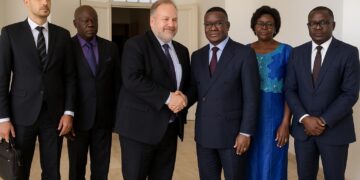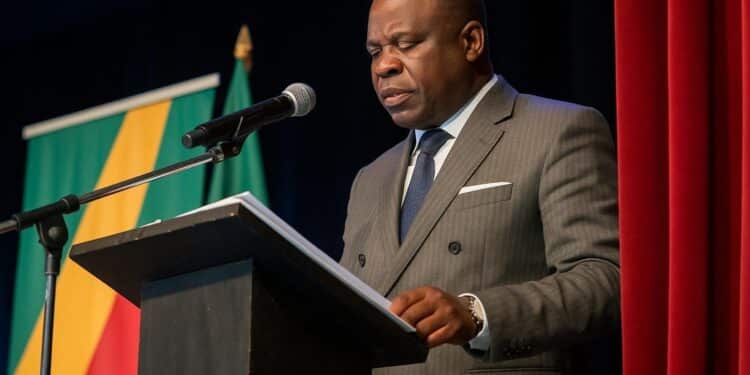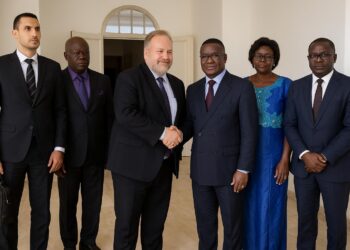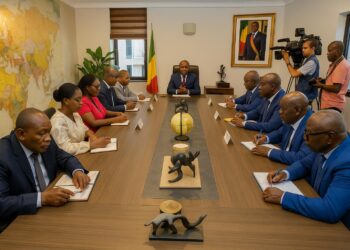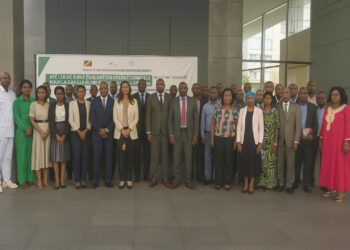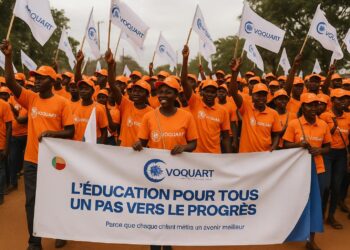Paris forum spotlights diaspora potential
Brazzaville’s Presidential Political Department adviser Rodrigue Malanda-Samba used a packed citizens’ forum at Paris’ Palais des Glaces on 13 September to urge Congolese abroad to “leave lethargic individualism behind” and organise as a collective financial force able to amplify national development.
Speaking without notes, the adviser argued that a structured diaspora could reinforce economic momentum, lift gross domestic product growth and counteract the narrative of a “noisy, violent minority” that, he warned, self-appoints as spokespersons for millions while discouraging investors with confrontation.
Malanda-Samba framed the mobilisation as part of President Denis Sassou Nguesso’s long-standing quest for a united, modern and equitable nation, insisting that peace of mind, mutual respect and the “spirit of mbongui” remain prerequisites for credible partnerships between citizens at home and those overseas.
Economic dynamism and GDP contribution
The economic argument dominated the discussion. The adviser reminded listeners that remittances, entrepreneurial know-how and professional networks are invaluable, yet dispersed potential cannot scale projects. A disciplined platform, he said, would channel savings into bankable ventures from agribusiness to digital services, aligning with national planning priorities.
Citing recent private-sector roundtables in Brazzaville, he observed that small and medium enterprises often lack patient capital, an issue a united diaspora could address by acting as anchor investors or guarantee providers, thereby improving firms’ creditworthiness and attracting complementary financing from local banks.
Beyond money, Malanda-Samba stressed knowledge transfer. Engineers, medical specialists and data scientists abroad can mentor counterparts, upgrade standards and help local regulators anticipate technology shifts. Such cooperation, he argued, turns brain drain into “brain circulation”, boosting competitiveness without compromising professional careers established in host countries.
Rejecting division, fostering cohesion
The adviser devoted significant time to national cohesion. He urged participants to reject tribalism, clanism and any rhetoric that pits Bantu and Indigenous communities against each other, describing such discourse as a diversion serving “enemies of the Republic” rather than legitimate debate on governance or opportunity distribution.
He linked inclusive dialogue to stability, noting that security, legal predictability and social harmony are prerequisites for foreign direct investment. By lowering the temperature of public discussion abroad, the diaspora can complement domestic reforms that aim to enhance the business climate and investor confidence.
Malanda-Samba therefore called for a “time of appeasement”. He argued that constructive criticism should remain, yet expressed through institutional channels rather than street confrontations or social-media invective, which he said tarnish the international image of Congo and dilute legitimate grievances in a haze of hostility.
The Palais des Glaces gathering also addressed practical matters ranging from taxation to voting rights. Participants raised questions on medical coverage, dual nationality and the portability of pensions. The adviser promised to collate these concerns and feed them into ongoing administrative reviews led by competent ministries.
Embassy-based support and policy interface
To institutionalise follow-up, Malanda-Samba announced the forthcoming creation of a Political Department liaison unit inside the Congolese embassy in France. The cell will, he said, serve as a single window, ensuring that proposals reach Brazzaville swiftly and that replies return with equal clarity.
He added that similar desks could be replicated in other diplomatic missions where sizeable Congolese communities reside, though timelines will depend on resource availability. In parallel, digital platforms are envisaged so that entrepreneurs in Rotterdam or Montreal face the same streamlined interface as those in Paris.
The initiative, organisers emphasised, is not a substitute for private associations already active in diaspora affairs; rather, it offers a state-anchored conduit through which vetted projects can secure policy guidance, regulatory clearances and, when appropriate, sovereign guarantees for international co-financing.
Implications for investors and policymakers
Applause punctuated the three-hour exchange, which drew several hundred attendees despite midweek scheduling. Many welcomed the direct access to a senior presidential adviser and praised what one participant called “a long-overdue shift from lamentation to proposition”. Embassy officials likewise highlighted the session’s calm, solutions-oriented atmosphere.
For cultural context, speakers evoked the mbongui, a traditional circular space where communities deliberate in openness. Reconnecting with this symbol abroad, they argued, can refresh civic culture at home by privileging consensus over acrimony and shared destiny over parochial gain.
Investors observing Congolese markets may see the initiative as a soft-power instrument that complements fiscal reforms, port modernisation and digitalisation strategies already under way. If effectively harnessed, diaspora capital could widen the funding pool for infrastructure and start-ups while providing an international test bed for new regulatory approaches.
For policymakers, the Paris forum underlines an emerging consensus: national development requires both domestic resolve and external mobilisation. Translating the rhetoric of unity into measurable projects will be the metric against which the diaspora, government agencies and private financiers alike judge the success of this renewed partnership agenda.








